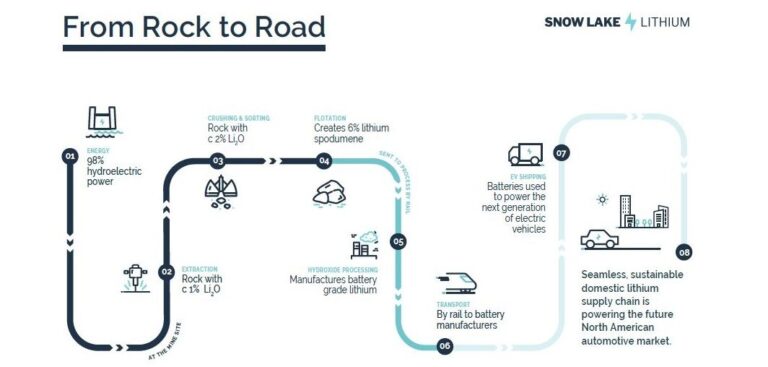Snow Lake Lithium has outlined plans to develop the world’s first all-electric lithium mine in Manitoba, Canada.
The company notes that North American automotive manufacturers have committed manufacturing capacity to meet the demand for electric vehicles, but the future of the automotive industry relies on sourcing lithium hydroxide domestically rather than importing it from China and Asia, as well as creating an integrated domestic supply chain.
Snow Lake Lithium plans to establish a joint venture to create a lithium hydroxide processing plant and is seeking a partnership with an automotive OEM or a battery manufacturer to deliver this.
Philip Gross, CEO of Snow Lake Lithium, said, “We are facing a once-in-a-century industrial pivot as North America accelerates towards an electrified future. If we don’t act now to secure a seamless lithium supply chain from rock to road, the North American car industry will not exist in 10 years’ time.
“Our ambition is to become the first fully integrated, carbon neutral lithium hydroxide provider to the North American electric vehicle industry. We are developing the world’s first all-electric lithium mine, operated by renewable power, and are currently looking for a joint venture partner to create a lithium hydroxide processing plant in the region.”
Based in Manitoba, Canada, Snow Lake Lithium says it is ideally located to serve the North American automotive industry with access to the US rail network via the Artic Gateway railway, which reduces transportation from thousands of miles by road and boat to just several hundred by train.
The 55,000-acre site is expected to produce 160,000 metric tons of 6% lithium spodumene a year over a 10-year period. Currently, the company has explored around 1% of its site and is confident that this will expand over the course of the next year. The mine will be operated by almost 100% renewable, hydroelectric power to ensure the most sustainable manufacturing approach.
Over the coming months, Snow Lake Lithium will continue its engineering evaluation and drilling program across its Thompson Brothers Lithium Project site, with the expectation that the mine will transition to commercial production in late 2024.


